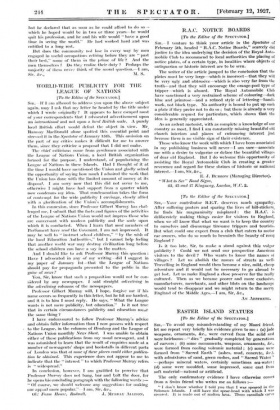WORLD-WIDE PUBLICITY FOR THE LEAGUE OF NATIONS
[To the Editor of the SPECTATOR.] SIR,----If I am allowed to address you upon the above subject again, may I ask that my letter be headed by the title under which I wrote originally ? It appears to have escaped most of your correspondents that I advocated advertisement upon an international and not upon a local British scale. A purely local British effort would defeat the object in view. Mr, Ramsay MacDonald alone spotted this essential point and stressed it in the Spectator of January 15th. This omission on the part of my critics makes it difficult for me to answer them, since they criticize a proposal that I did not make.
The chief criticisms come from gentlemen associated with the League of Nations Union, a local British organization formed for the purpose, I understand, of popularizing the League of Nations in these Islands. Had I thought of it at the time I would have mentioned the Union and gladly seized the opportunity of saying how much I admired the work that the Union has done with the limited amount of money at its disposal. I am sorry now that this did not occur to me, otherwise I might have had support from a quarter which now condemns my idea. That condemnation takes the form of contempt for the wide publicity I envisage, closely allied with a glorification of the Union's accomplishments.
In this connexion, since Professor Gilbert Murray has chal- lenged me, I submit that the facts and figures of the activities of the League of Nations Union would not impress those who are conversant with modern publicity and the scale upon which it is conducted. When I learn that most members of Parliament. have read the Covenant, I am not impressed. It may be well to " instruct school children," " by the wish of the local Education Authorities," but I cannot help feeling that another world war may destroy civilization long before the school children can have a say in the matter.
And I should like to ask Professor Murray this question : Have I advocated in any of my writing -- did I suggest in my paper of January 1st—that the League of NationS should pay for propaganda presented to the public in the guise of news?
'You, Sir, know that such a proposition would not be con- sidered by any newspaper. I said straight advertising in the advertising columns of the newspapers.
Professor Gilbert Murray will, I hope, forgive me if his name occurs so frequently in this letter, but he hit me hardest, and it is to him I must reply. He says, " What the League wants is not mere publicity, but education." Is it not true that in certain circumstances publicity and education mcur. the same thing ?
I have endeavoured to follow Professor Murray's advice and obtain fuller information than I now-possess with respect to the League, in the columns of headway and the League of Nations Union monthly News Sheet. I was unable to obtain either of these publications from may usual newsagent, and I was astonished to learn that the result of enquiries made at a number of newsagents' shops and bookstalls in different parts of London was that at none of these places could either publica- tion be obtained. This experience does not appear to me to indicate that the " interest " to which Professor Murray refers is " widespread."
In conclusion, however, I am gratified to perceive that Professor Murray does not bang, bar and bolt the door, for he opens his concluding paragraph with the following words :- " Of course, we should welcome any suggestions for making our appeal more popular."---1 am, Sir, &c.,










































 Previous page
Previous page